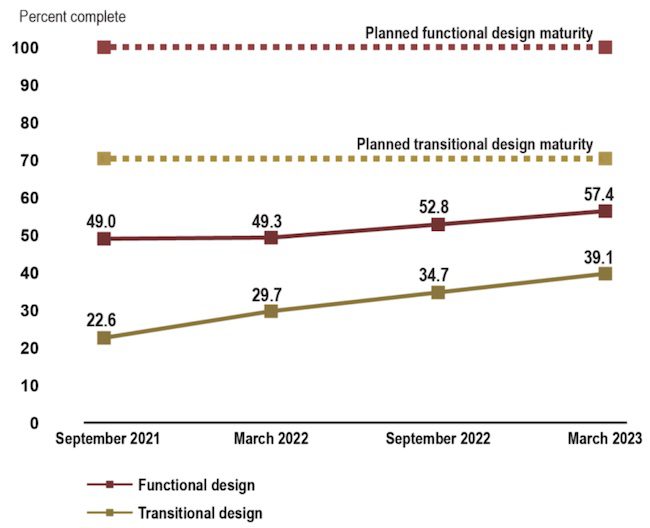Great Lakes Icebreaker Funding Cut from Senate Bill
Michigan Representative Bill Huizenga is leading efforts to restore funding for a new Great Lakes icebreaker that was included in the House-passed version of the One Big Beautiful Bill but...
By Malte Humpert (gCaptain) –
The bad news for the U.S. Coast Guard’s Polar Security Cutter program keeps on coming. A new Congressional Budget Office (CBO) report details further cost overruns and delays for the program originally authorized in 2019.
Most significantly, little progress has been made on finalizing the vessel’s design over the past several years. According to the CBO as of July 2024 the vessel’s design remains at only 59 percent complete, even less than the 67 percent the Government Accountability Office reported in May of this year.
Progress on the vessel’s functional and traditional design has seen progress at a glacial pace over the past three years, with maturity continuing to hover around the 50 percent mark.
Despite this lack of progress Coast Guard leadership continues to express confidence that construction on the first PSC, tentatively named Polar Sentinel, will begin before the end of the year. The GAO warned that beginning construction before reaching 100% design maturity increases program risks and may lead to delays down the line.

The new CBO report estimates cost overruns for the procurement of three PSC at $5.1 billion, 60 percent above the Coast Guard latest estimates. The increase comes in part due to the late-stage design changes increasing the vessel’s size by 40 percent from 13,000 tons to 18,000 tons; a cost addition the Coast Guard has not fully taken into account the report explains.
Lifetime costs for operation and mission support will total $12.4 billion between 2029 and 2063. If the USCG were to acquire additional vessels – the service says it may need up to five heavy icebreakers – costs would nearly double to $21.2 billion. The Coast Guard’s budget for FY 2025 stands at $13.8 billion.
In order to have a continuous 2.5 icebreaker-presence the Coast Guard estimates it will require an eight or nine-ship fleet when factoring in maintenance.
Both existing icebreakers, Healy and Polar Star, are out of service this summer following an onboard fire and scheduled dry dock time, leaving the U.S. without surface vessel presence in the Arctic.
The timeline for service entry of Polar Sentinel has now slipped into 2029 the CBO report details, a full 10 years after the contract was awarded.
In contrast, it took only 5 years from authorization to commissioning of the Coast Guard’s last heavy icebreaker from 1971 to 1976.
The delays are a symptom of naval construction in the U.S. generally, the report states.
“The shipyards that built the Polar Star and the Healy have closed, and no existing shipyard in the United States has built a heavy polar icebreaker since before 1970.”
Yards face difficulties hiring new qualified workers and retaining the existing workforce.
“A generation of longtime senior shipyard workers have retired or will soon be retiring. As a result, the workforces in many of those yards are, overall, less experienced than they were in the past,” the CBO concludes.

Sign up for gCaptain’s newsletter and never miss an update

Subscribe to gCaptain Daily and stay informed with the latest global maritime and offshore news


Stay informed with the latest maritime and offshore news, delivered daily straight to your inbox
Essential news coupled with the finest maritime content sourced from across the globe.
Sign Up